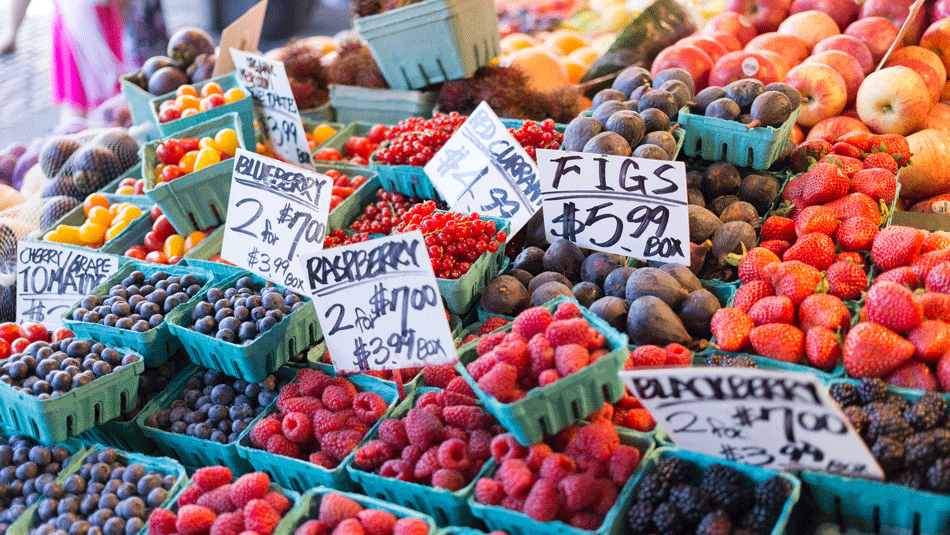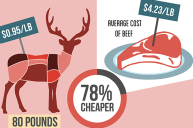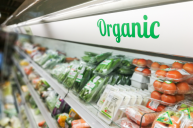No one expects you to become a farmer or a nouveau hippy if you decided you want to become more sustainably minded. You may even be on the right path already: recycling, drinking from a reusable water bottle and walking, cycling or taking public transport instead of driving all count.
Videos by Wide Open Country
However, the most important thing you can do to contribute to sustainability is to carefully consider what is going into your grocery basket.
It is a well purported myth that you must purchase expensive, organic foods or shop at 'foodie' markets to be buying sustainable products. But in reality, eating sustainably can often be better for your pocketbook in addition to the environment.
To prove my above statement, I will give you a personal example. Last weekend, I bought some locally grown vegetables at the market that were gorgeous. They looked and tasted better than anything I can get at the store for the exact same price.
While I was there, I also picked up some sustainably harvested fish from a fishmonger I know that was $2 per pound cheaper than the supermarket! For the record, I actually compared prices.
There is no reason to make major life changes to increase the sustainability of your food choices. In fact, it should be quite easy. Starting small and staying within your means -- both financially and ability-wise, is the best way to begin.
So how do you do it? Here are 7 simple strategies to help you dig in and get started.
1. Learn to cook
Learning to cook your favorite foods, especially when you incorporate seasonal, local ingredients, cooking can really make a difference. While the satisfaction and taste of a home-cooked meal should be enough to persuade you to try your hand with a knife, perhaps there is stronger motivation to be had.
Learning to cook has been proved time and again to save you bundles of money.
2. Buy organic
This piece of advice likely doesn't come as any shock; you've been encouraged to eat organic food for years. It is possible, however, that you were never told exactly why.
US organic food is required to adhere to certain standards that promote biodiversity, sustainability, natural plant fertilization, natural pest management, and soil integrity. All these standards in turn serve to encourage diversity and thereby health within American crops.
Sure, this explanation doesn't alleviate cost, but you can start small by switching to the organic equivalents of the Dirty Dozen, or the 12 most pesticide-heavy produce products.
3. Shop locally and in season
Think about the true cost of Scottish salmon. Sure it might be $17.99 a pound, but you're forgetting to factor in a handful of hidden costs.
The Scottish salmon is dependent on foreign oil, has travelled thousands of miles to your plate, and does not support the local economy.
So why wouldn't you buy the local alternative? It will taste fresher, anyways.
4. Reduce the amount of meat + dairy you eat
Don't give up now carnivores! Hear me out here. I promise I'm not going to ask you to convert to vegetarian or vegan-ism. However, I do think you should be aware that meat production is responsible for 18 percent of the world's greenhouse gas emissions, according to the United Nations Food and Agriculture Organization.
That being said, you do not have to give up meat entirely. Maybe only once a week? If it still seems like too much, check out #MeatlessMonday to give yourself a support system in making the change.
If you do choose to reduce your meat consumption, know that just one day less of meat a week can lower your risk of cancer, cardiovascular disease, diabetes and obesity, in addition to reducing your carbon footprint and saving natural resources.
5. Reduce packaging
I know that those individually wrapped snacks are just so convenient. But really, does it make that much of a difference in your life to spend 30 seconds packaging your own snack in a reusable container?
Try to buy things in bulk instead of pre-packaged. Or if you do buy things that are already packaged, reuse that package. That spinach container is a great way to store leftovers.
6. Speak with your elders
Part of the reason that we spend so much on food and generate so much waste is that old, conventional culinary wisdom has ceased to be passed down. Now we judge a product's expiration by its printed "best if used by" date rather than our noses.
Likewise, no longer do we preserve nature's cheap and plentiful summertime bounty into jams and pickles. Nor do many of us structure our cooking schedules around leftovers. For example, my grandmother would cook meat on Sunday, serve it cold on Monday, and grind and freeze the rest on Tuesday.
By sitting down with your elders, you can rediscover some of these frugal tricks that can help keep costs and waste to a minimum.
7. Eat less
Possibly the best way to reduce your impact on the environment, eating less also encourages you to prepare more thoughtful meals as well as enjoy them more.
For almost everyone, our waistlines will thank us too.




